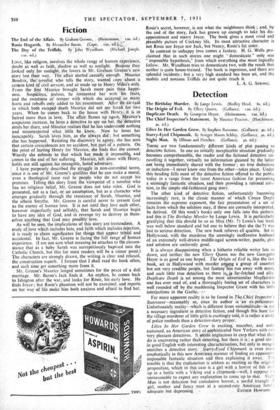Fiction
The End of the Affair. By Graham Greene. (Heinemann. ios. 6d.)
Rosie Hogarth. By Alexander Baton. (Cape. les. ...- LOVE, like religion, involves the whole range of human experience, doubt is well as faith,..shadow as well as 'sunlight. Because they
looked only. for sunlight, the loveis in Mr. Graham Greene's new. story lost their way. The affair started' casually enough. ,Maurice Bendrix, the novelist who tells the story, wanted copy abouts'a certain kind of civil servant, and so made up to Henry Mifes's wife. From the .first Maurice brought Sarah more pain than happi- ness. SuspiCirous, jealous, he .tormented her with his fears, and the sweetness of temper with which she accepted so many
hurts and rebuffs only added to his.: resentment. Afterft-air-raid in which both escaped. death Maurice did not see Sarah for -two -.years. When he comes back to 'the house with Henry, it is in hatred more than in love. The affair flames up again; Maurice's
suspicions increase, he hires a detective to spy on her, the detective steals her diary, and Maurice realises that he has understood nothing and misinterpreted what_ little he knew, Now he loves her
inescapably. Sarah loves him, as she always did ; but something else has happened,= ReiiSting the disCovery in agony, she has seen that certain coincidences are no accident, but part- of a pattern,. On . the point of lea'Ving Henry for Maurice, she finds that she cannot. Wearily she submits lo that which has -made it impossible, and comes to the end of her suffering. Manriee, left alone with Henry, holds out still against.his intangible, hated adversary.
I have purposely'described the struggle_ in non-committal terms, since it is one of M. Greene's qualities that he can make a moral, even a theological issue real to people who do not accept his premises. Telling this story froth the Viewpoint of a novelist who has no religious belief, Mr. Greene does not take sides: God is presented, not as a fact, nr,:anr assumption, but as a character who emerges gradually through the resistance of Sarah, Maurice, and the atheist Smythe. Mr. Greene is careful never to present God
as the enemy of human love. It is not until they love each other, however imperfectly and selfishly, that Sarah and Maurice begin to have any idea of God, and in revenge try to destroy in them- selves anything that God may possibly-love.
As will be seen, the implications of this story are.tremendots. A study of love which includes hate, and faith which includes-rejection, it is ready to claim significance for things that appear tri#al and accidental. In fact, Mr. Greene is facing the full range of human experience. (I am not sure what meaning he attaches to the circum- stance that as a baby Sarah was surreptitiously baptised into the Catholic Church, but this for most readers will be a minor point.) The characters are strongly drawn, the writing is clear and relaxed, the construction superb. I foresee that I shall read the book often, and each time get something more from it. Mr. Greene's Maurice longed sometimes for the peace of a dull marriage. Mr. Baron's Jack finds it. An orphan, he comes back to Islington after the war, and looks for Rosie, his early love. He finds Joyce ; but Rosie's phantom will not be exorcised, and reports on her way of life make him both anxious and afraid to find her. Rosie's secret, however, is not what the neighbours think ; and, by the end of the story, Jack has grown up enough to take his dis- appointment and marry Joyce. The book gives a most vivid and plausible picture of Cockney life. Its most attractive character is not Rosie nor Joyce nor Jack, but Nancy, Rosie's fat sister.
In contrast to unhappy love comes a fantasy. H. G. Wells pro- claimed that in such stories one might " domesticate " only one " impossible hypothesis," from which everything else must logically follow. Mr. Wyndham tries to domesticate two, with the result that neither is quite house-trained. The book is ingenious, and there are splendid incidents ; but a very high standard has been set, and the mobile and noxious Triffids do not quite reach it.
L. A. G. STRONG.


































 Previous page
Previous page